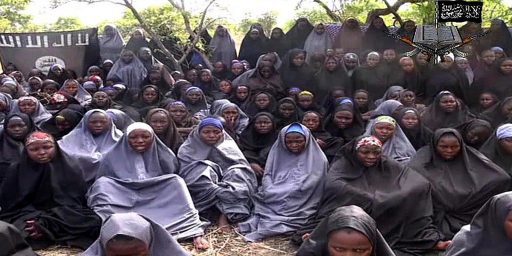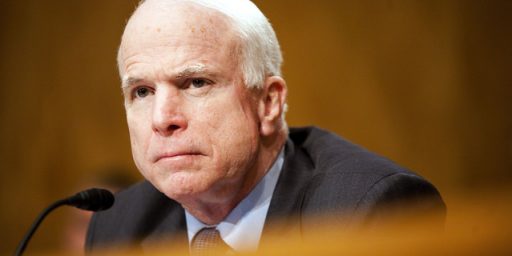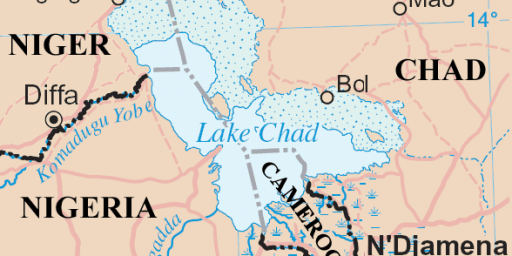Nigeria’s GDP Largest in Africa
Via the BBC: Nigeria becomes Africa’s biggest economy
Nigeria has "rebased" its gross domestic product (GDP) data, which has pushed it above South Africa as the continent’s biggest economy.
Nigerian GDP now includes previously uncounted industries like telecoms, information technology, music, online sales, airlines, and film production.
GDP for 2013 totalled 80.3 trillion naira (£307.6bn: $509.9bn), the Nigerian statistics office said.
That compares with South Africa’s GDP of $370.3bn at the end of 2013.
That is the total economic output, but on the more significant per capita measure, South Africa remains quite a bit larger:
Nigeria’s economic output is underperforming because at 170 million people, its population is three times larger than South Africa’s.
On a per-capita basis, South Africa’s GDP numbers are three times larger than Nigeria’s.
Indeed, according to the CIA World Factbook, Nigeria’s GDP per capita is $2,800 and South Africa’s is $11,500 (PPP 2013 estimates). That puts Nigeria at 180th in the world and South Africa at 108th. South Africa’s per capita GDP is comparable to Brazil’s while Nigeria’s is like the Sudan or Cambodia.
As such, the following strikes me as an accurate assessment:
Nigerian financial analyst Bismarck Rewane called the revisions "a vanity".
He added: "The Nigerian population is not better off tomorrow because of that announcement. It doesn’t put more money in the bank, more food in their stomach. It changes nothing."





Dear valued friend,
I am the Minister of Nigerian Finance. As you know, Nigeria has a large GDP now. Unfortunately, much of that GDP is tied up in a bank account in an important Swiss Bank, and I need your help to obtain the $5 billion ($5,000,000,000) in funds ….
@JWH:
Absolutely amazing
No entirely true the revision decreases the rate of growth which will also reduce the amount of foreign capital that is likely to come in. But it also lowers interest rates on IMF loans so it should allow the government to borrow cheap for public works projects. Like irrigation or water sanitation which in the long run will help the people.
A vanity? Again, Steven, I find it hard to believe that you work in political science. Good data matter.
@Pinky: I think that is because you don’t understand what you think you understand.
I have no problem with the the revision in the sense that it may provide more accurate data, but that’s not the point of the quote. The quote is noting that being able to have “the biggest GDP in Africa” is, in fact, a vanity when one takes into account the better metric, GDP per capita. Indeed, part of the point of the post is to highlight that raw GDP is not the best metric in these comparisons.
Why is that difficult to understand?
@Dave D: This will hopefully be the case.
@Steven L. Taylor:
Because unless they changed the population estimate by exactly the same percentage, this does affect their estimate of per capita GDP.
@Pinky: You are missing the point entirely. Even an upward revision of GDP per capita with the new GDP figures is still going to have Nigeria classified as extremely poor. The story itself notes “On a per-capita basis, South Africa’s GDP numbers are three times larger than Nigeria’s” which comports with the basic math of the numbers cited by the CIA (which, granted, would not take into account the upward revision in GDP)–still, surpassing SA in raw GDP is just a bragging rights kind of thing (or, one might call it vanity).
I really don’t even understand what point you are making (but that tends to be the case in these threads–you seem to want to be making profound points about my use of language, concepts, or evidence, but it is never clear what you are really arguing–like the ownership/control discussion that you abandoned the other day).
I am more than happy to be corrected or have additional ideas brought to a discussion, but it seems reasonable to ask that evidence and logic be brought along with the criticisms.
(If your basic point is that the CIA Worldfactbook numbers would not take into consideration the revisions, you are, of course, correct. But that does not in any way affect the basic point being made).
@Steven L. Taylor: That’s ok. I’m pretty much in the same spot you are: so baffled by the other person’s comments that I’ve given up trying to talk sense to him. My comments are primarily intended so that another reader can compare the points we’re making.
@Pinky: So what is your point?
@OzarkHillbilly: I thought I made my points. There isn’t a lot of great data in the world of the social sciences. I’d think that anyone in the social sciences would be happy about an improvement in accuracy. (I’ve seen no suggestion that the numbers aren’t more accurate.) I don’t think anyone ascribes magical powers to the report; if the numbers are higher, it doesn’t change the condition of the people of Nigeria, but any human with feelings has got to be encouraged by the fact that the people of Nigeria are doing better than we thought they were. And of course, GDP isn’t everything (absolute poverty is probably a more important statistic for the developing world) and South Africa isn’t Utopia, but the BBC did a good job by providing some comparisons. All in all, I don’t see any good reason for Steven to have highlighted and endorsed a pessimistic perspective.
@Pinky: Again, you are missing the specific point about the difference between GDP and GDP per capita as well as the degree to which raw GDP comparisons are often more about nationalism than accuracy. I am all for more accurate numbers and data,
Again: why is this so hard to understand? Why do you insist on pretending like I was criticized better data? I can understand if my basic point was not clear, but I really am having a hard time seeing how I have not underscored the issue.
I also provided some comparative cases to put the numbers in perspective because I think that provides a better understanding of the actual economic conditions under discussion.
Also part of the point is this: Nigeria actually isn’t the wealthiest country in Africa because raw GDP doesn’t actually provide a good measure for that category.
All of what i have just typed is about good social science, in fact.
@Pinky:
Because the assessment in question actually provides a better understanding of the situation than does the headline.
And BTW: you do realize that the quotation I highlighted was from the BBC story that you say did a good job. And, also, I provided more comparative information than did the BBC.
The indented text is from the BBC piece, the rest is from me.
Nigeria has something to teach the world about energy use! How does Nigeria power a $510 billion economy with a population of 170 million people on 4500 mw of electricity? Meanwhile in South Africa 45 000 mw are not enough for 52 million souls with a $384 billion GDP!
Nigeria is a major oil producer. South Africa is not. While South Africa produces many other natural resources, nothing else compares to oil as a revenue source.